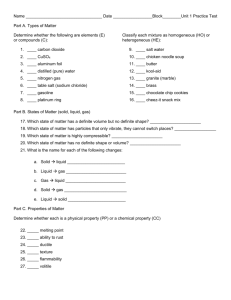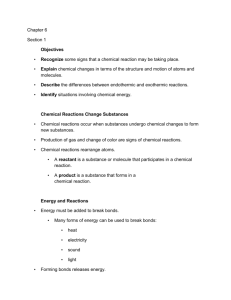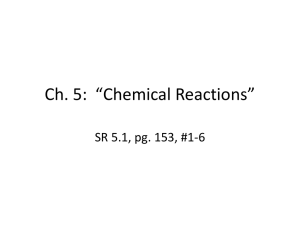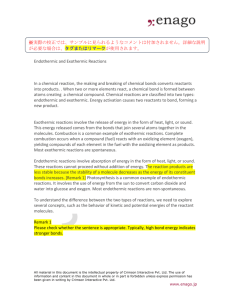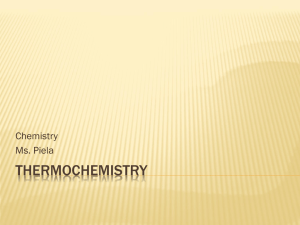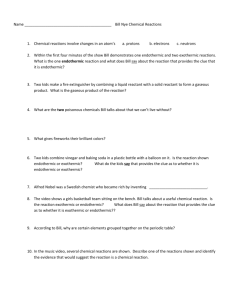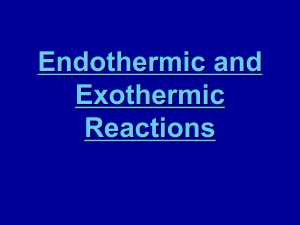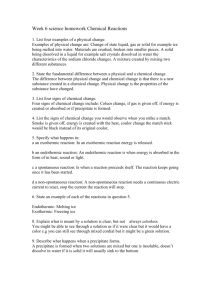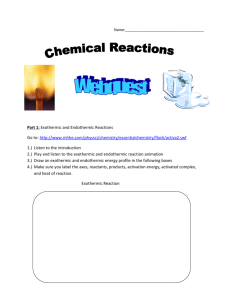thermochemistry calculations worksheet 1
advertisement
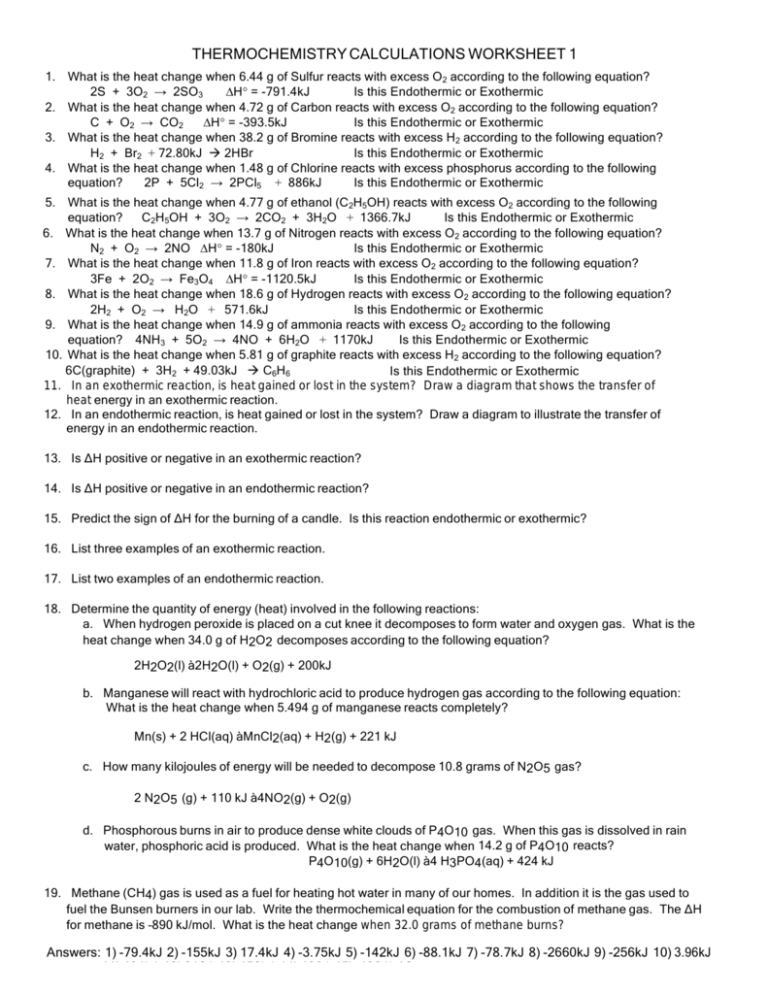
THERMOCHEMISTRY CALCULATIONS WORKSHEET 1 1. What is the heat change when 6.44 g of Sulfur reacts with excess O2 according to the following equation? 2S + 3O2 → 2SO3 ∆H° = -791.4kJ Is this Endothermic or Exothermic 2. What is the heat change when 4.72 g of Carbon reacts with excess O2 according to the following equation? C + O2 → CO2 ∆H° = -393.5kJ Is this Endothermic or Exothermic 3. What is the heat change when 38.2 g of Bromine reacts with excess H2 according to the following equation? H2 + Br2 + 72.80kJ à 2HBr Is this Endothermic or Exothermic 4. What is the heat change when 1.48 g of Chlorine reacts with excess phosphorus according to the following equation? 2P + 5Cl2 → 2PCl5 + 886kJ Is this Endothermic or Exothermic 5. What is the heat change when 4.77 g of ethanol (C2H5OH) reacts with excess O2 according to the following equation? C2H5OH + 3O2 → 2CO2 + 3H2O + 1366.7kJ Is this Endothermic or Exothermic 6. What is the heat change when 13.7 g of Nitrogen reacts with excess O2 according to the following equation? N2 + O2 → 2NO ∆H° = -180kJ Is this Endothermic or Exothermic 7. What is the heat change when 11.8 g of Iron reacts with excess O2 according to the following equation? 3Fe + 2O2 → Fe3O4 ∆H° = -1120.5kJ Is this Endothermic or Exothermic 8. What is the heat change when 18.6 g of Hydrogen reacts with excess O2 according to the following equation? 2H2 + O2 → H2O + 571.6kJ Is this Endothermic or Exothermic 9. What is the heat change when 14.9 g of ammonia reacts with excess O2 according to the following equation? 4NH3 + 5O2 → 4NO + 6H2O + 1170kJ Is this Endothermic or Exothermic 10. What is the heat change when 5.81 g of graphite reacts with excess H2 according to the following equation? 6C(graphite) + 3H2 + 49.03kJ à C6H6 Is this Endothermic or Exothermic 11. In an exothermic reaction, is heat gained or lost in the system? Draw a diagram that shows the transfer of heat energy in an exothermic reaction. 12. In an endothermic reaction, is heat gained or lost in the system? Draw a diagram to illustrate the transfer of energy in an endothermic reaction. 13. Is ΔH positive or negative in an exothermic reaction? 14. Is ΔH positive or negative in an endothermic reaction? 15. Predict the sign of ΔH for the burning of a candle. Is this reaction endothermic or exothermic? 16. List three examples of an exothermic reaction. 17. List two examples of an endothermic reaction. 18. Determine the quantity of energy (heat) involved in the following reactions: a. When hydrogen peroxide is placed on a cut knee it decomposes to form water and oxygen gas. What is the heat change when 34.0 g of H2O2 decomposes according to the following equation? 2H2O2(l) à2H2O(l) + O2(g) + 200kJ b. Manganese will react with hydrochloric acid to produce hydrogen gas according to the following equation: What is the heat change when 5.494 g of manganese reacts completely? Mn(s) + 2 HCl(aq) àMnCl2(aq) + H2(g) + 221 kJ c. How many kilojoules of energy will be needed to decompose 10.8 grams of N2O5 gas? 2 N2O5 (g) + 110 kJ à4NO2(g) + O2(g) d. Phosphorous burns in air to produce dense white clouds of P4O10 gas. When this gas is dissolved in rain water, phosphoric acid is produced. What is the heat change when 14.2 g of P4O10 reacts? P4O10(g) + 6H2O(l) à4 H3PO4(aq) + 424 kJ 19. Methane (CH4) gas is used as a fuel for heating hot water in many of our homes. In addition it is the gas used to fuel the Bunsen burners in our lab. Write the thermochemical equation for the combustion of methane gas. The ΔH for methane is –890 kJ/mol. What is the heat change when 32.0 grams of methane burns? Answers: 1) -79.4kJ 2) -155kJ 3) 17.4kJ 4) -3.75kJ 5) -142kJ 6) -88.1kJ 7) -78.7kJ 8) -2660kJ 9) -256kJ 10) 3.96kJ 11) 101kJ 12) 912J 13) 152kJ 14) 186J 15) .132J/g°C
